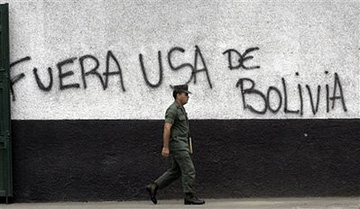
|  |  |  Americas & Beyond | September 2008 Americas & Beyond | September 2008  
US and Venezuela Escalate Crisis
 Frank Jack Daniel & Arshad Mohammed - Reuters Frank Jack Daniel & Arshad Mohammed - Reuters
go to original


| | A member of Venezuela's army walks next to an anti U.S. graffiti in Caracas, Friday, Sept. 12, 2008. Venezuela's President Hugo Chavez announced Thursday the ousting of U.S. Ambassador in Venezuela supporting a similar measure taken by Bolivia's President Evo Morales. The U.S. also expelled both Venezuela's and Bolivia's ambassadors in response. The graffiti reads in Spanish: 'Out the U.S. from Bolivia'. (AP/Howard Yanes) | | |
Caracas/Washington - The United States imposed sanctions on Venezuelan officials on Friday, escalating a diplomatic crisis between leftist Latin American leaders and Washington that raises the specter of an oil supply cutoff.

The sanctions and Venezuelan President Hugo Chavez's threat to stop crude sales to the United States plunged ties between the superpower and one of its top energy suppliers to the lowest point in years.

Chavez, who calls Cuba's Fidel Castro a mentor and sees Russia as a counterbalance to U.S. power, had warned on Thursday that world crude prices would immediately double to above $200 a barrel if he cuts oil to the United States.

The clash was part of a long-brewing conflict between the United States and Latin America's bloc of left-wing leaders antagonistic to traditional U.S. dominance in the region.

Tensions were already high after Chavez allowed two Russian long-range bombers to land in Venezuela and took Moscow's side in disputes over Georgia and U.S. plans for a missile shield in eastern Europe.

This week's crisis began when Bolivia expelled its U.S. ambassador, accusing him of fueling protests against leftist President Evo Morales, a close ally of Chavez.

In an expletive-laden tirade against "Yankees," Chavez ejected the U.S. ambassador to Venezuela on Thursday and Honduras weighed in on Friday, blocking a U.S. envoy from immediately taking up his post as ambassador.

INTERNAL CHALLENGES

State Department spokesman Sean McCormack denied the United States had done anything wrong in the countries and said: "This reflects the weakness and desperation of these leaders as they face internal challenges."

Washington said on Friday it was expelling the Venezuelan ambassador and imposed sanctions on Chavez aides, including Venezuela's ex-Interior Minister Ramon Rodriguez, for allegedly aiding rebels in Colombia.

It is unclear whether Chavez knew in advance that U.S. sanctions were coming against his officials, but Rodriguez resigned unexpectedly last weekend. The Venezuelan leader, an ex-soldier trained in a tank division, often uses a strategy that his best form of defense is attack.

Chavez was briefly ousted in a 2002 coup initially welcomed by Washington. Even at that time, Chavez did not go so far as to expel the U.S. ambassador and has been a reliable oil supplier.

U.S. Ambassador Patrick Duddy has kept a comparatively low profile in Caracas but the Bush administration has needled Chavez over issues from drugs cooperation to airline safety.

This year, laptops found by Colombia in a rebel camp were seized on by Washington as evidence of cooperation between Venezuelan officials such as Rodriguez and Colombian rebels.

Despite his popularity among the majority poor, Chavez fears losing seats in regional elections in November because of the poor performance of many of his local officials.

Chavez may hope the diplomatic crisis along with charges he made on Thursday of a plot to kill him will fire up his support base at the start of the election campaign.

Chavez said he would not restore normal ties before U.S. President George W. Bush leaves the White House in January.

On Friday, Venezuela's debt bonds lost value - a gauge of investor risk perception.

(Editing by Saul Hudson and David Storey) |

 |
|  |



